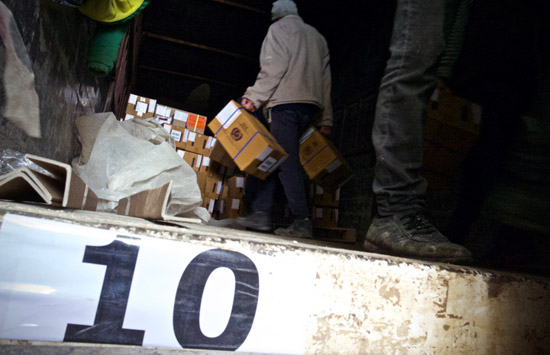WHO provides more than 225 000 courses of treatment to internally displaced Syrians in Idlib and Aleppo
 28 February 2020, Geneva/Copenhagen/Cairo – In a two-day operation the World Health Organization sent 55 tons of medicine and medical supplies in 7 trucks from Turkey into Idlib governorate and parts of Aleppo. Since December 2019 the area has witnessed the largest exodus of internally displaced Syrians in the 9-year history of the Syria conflict.
28 February 2020, Geneva/Copenhagen/Cairo – In a two-day operation the World Health Organization sent 55 tons of medicine and medical supplies in 7 trucks from Turkey into Idlib governorate and parts of Aleppo. Since December 2019 the area has witnessed the largest exodus of internally displaced Syrians in the 9-year history of the Syria conflict.
“This is the bleakest situation we’ve been in since the war started. Peoplehave no idea where to go, they only know they need to get away from the bombing,” says a surgeon in northwestern Aleppo governorate.
As hostilities and forced displacement towards the Turkish border continue the burden on health facilities is growing. Of the 84 health facilities forced to suspend operations since December last year just 31 have been able to relocate to places where people are seeking refuge from bombardments.
As a result, every 4 weeks 133 000 medical outpatient consultations do not take place, 11 000 trauma patients do not receive treatment and 1500 major surgeries are not performed.
Displacement has led to the depopulation of entire areas, resulting in disproportionate caseloads in Idlib's functioning health facilities. In some areas health facilities are deserted, in others they are stretched far beyond their capacity.
"These supplies meet a dire and growing need and will enable services to continue. In 3 months nearly 1 million people have been displaced”, says Richard Brennan, WHO Regional Emergency Director for the Eastern Mediterranean.
The supplies, transported in UN convoys via the Bab al Hawa and Bab al Sama border crossings on 25 and 26 February, included equipment for 3200 trauma and surgical treatments which is being distributed to WHO’s implementing health partners in more than 150 facilities - half of the functioning health facilities in northwest Syria.
“The burden and sacrifice of health workers in the northwestern governorates is unimaginable. It’s only a matter of days until we pass 1 million displaced people. That means health responders are working around the clock to serve patients, under enormous strain and often putting their lives on the line,” says Brennan.
While there has been a sharp rise in trauma cases, health workers are also treating respiratory tract infections due to poor shelter and harsh weather conditions, and complications of non-chronic diseases such as heart disease and diabetes which have been exacerbated by irregular access to medicines.
Partners of the World Health Organization providing health services in the area describe how overwhelmed health staff and facilities are.
“This is not sustainable. The majority of our hospital staff on the ground evacuated to the north with their families and then chose to return to Idlib city to continue taking care of patients. People’s mental health is poor, both of those seeking assistance and of health staff alike," said a pediatrician in Idlib city, before adding that there was neither the time nor the capacity to deal with issues that are not life-threatening,
“Primary health care centers and hospitals are trying to work with what they have but the caseload in some hospitals has doubled while resources are either what they were or less. The number of hospitals and health centers around us is still decreasing due to the frequent targeting of health facilities,” said a general practitioner working 10 km from Darat Izza in Aleppo governorate where two hospitals were attacked on 17 February. of particular concern are shortages of medicine, gloves, syringes and bandages.
As of 28 February, attacks on health care in Syria since the mass displacement started on 1st of December 2019 have caused 10 deaths and 37 injuries.
Stills and footage from Bab al Salam and Bab al Hawa border crossings, February 25-26, 2020.
For more information:
Hedinn Halldorsson
WHO Gaziantep
+90 538 544 29 57
Inas Hamam
WHO Regional Office
Cairo
+20 01000 157 385


